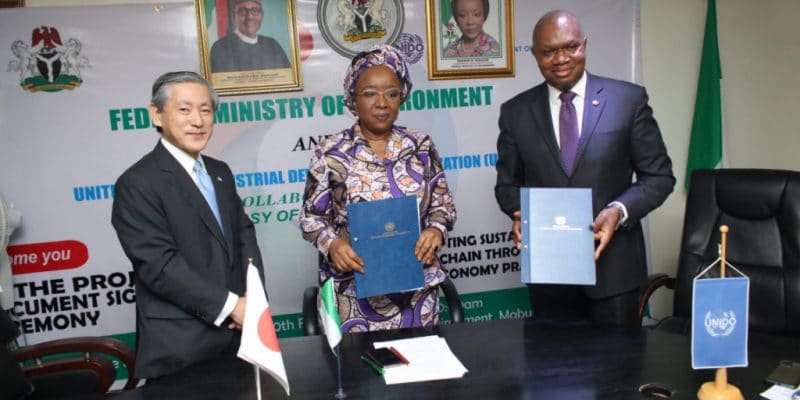The Nigerian government will step up the promotion of projects contributing to the emergence of the circular economy in the plastics sector, thanks to new funding. The funding is 319 million yen (about $2.8 million), recently committed by Japan and the United Nations Industrial Development Organization (UNIDO).
The funding agreement was signed on February 10, 2022, in Abuja between the Nigerian Federal Ministry of Environment, the Japanese Embassy in Nigeria and the United Nations Industrial Development Organization (UNIDO). The 319 million-yen (nearly $2.8 million) funding comes after Nigeria joined the “marine initiative” launched by Japan to support the G20 Osaka Blue Ocean Vision. The ambition is to reduce marine plastic waste pollution to zero by 2050 worldwide, particularly in Africa, through a comprehensive life cycle approach.
For example, the Nigerian government plans to develop guidelines for the implementation of sustainable plastic waste management projects at the national and state levels. The Federal Government of Nigeria plans to strengthen recycling value chains in selected municipalities in Lagos and the Federal Capital Territory (Abuja), as well as technology demonstration of circular economy and resource efficiency practices. Actions, which will support the efforts already undertaken by the West African country on plastic waste management.
Read Also – AFRICA: the circular economy at the heart of ecosystem preservation
In 2020, a national policy on plastics recovery (into secondary raw materials, biogas or electricity) was developed by the Nigerian authorities with the support of UNIDO. A year later, in 2021, Nigeria joined the multilateral initiative against plastic pollution, the Global Partnership for Action on Plastics (GPAP) of the World Economic Forum. This new alliance created the Nigeria Action Partnership, which brings together policymakers, business leaders and civil society to develop a national action plan to reduce plastic pollution, combining high-potential solutions with strategic funding opportunities.
A growing crisis…
Nigeria will also work with the global platform to raise awareness among businesses and consumers about sustainable plastic waste management practices. While initiatives are multiplying in the country, the results are slow to be seen.
According to the World Economic Forum, in 2018 Nigeria was dumping about 200,000 tons of plastic waste into the ocean per year. At least 70% ends up in landfills, sewers, beaches and water bodies with disastrous consequences for ecosystems. Efforts made with new funding from Japan (Nigeria’s partner since 2020) and UNIDO (Nigeria’s partner since 2013) could tip the balance and avoid the scenario envisioned by GPAP of 523,000 tons of plastic waste per year by the end of 2022.
Inès Magoum






